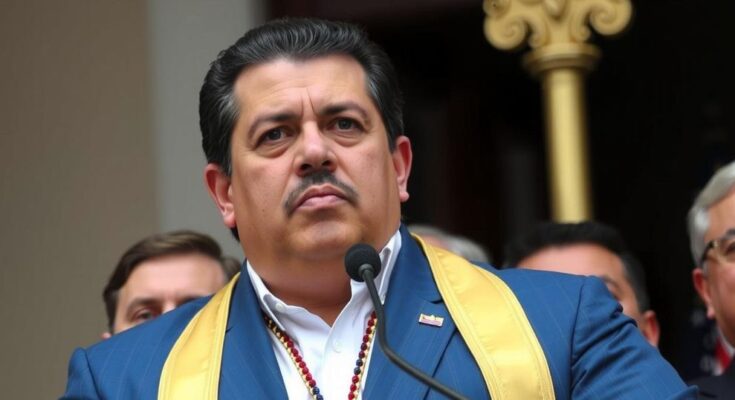Nicolás Maduro was sworn in for a third presidential term in Venezuela, following disputed elections rejected by the opposition and international observers. Maduro vowed to lead a “period of peace” during his term. The political climate remains tense, with reports of opposition leader María Corina Machado’s brief detention and increasing governmental repression against dissent.
Venezuela’s Nicolás Maduro was officially sworn in for a third term as president on Friday, approximately six months following contentious elections deemed lost by the opposition and various international observers. During the ceremonial oath-taking held before parliament, President Maduro asserted that his upcoming six-year term would mark a “period of peace.” His inauguration occurred a day after opposition leader María Corina Machado was reportedly detained and later released following her participation in a protest rally in Caracas.
The official results of the July elections, which declared Maduro the victor according to Venezuela’s National Electoral Council, have faced widespread skepticism both domestically and globally. Prominent neighboring nations such as Brazil and Colombia have rejected the results, aligning with the opposition that recognizes Edmundo González as the legitimate president-elect. Following his departure to Spain in September after the elections, González has been actively campaigning for international support against Maduro’s regime.
In an address during the inauguration, Maduro proclaimed, “I swear that this new presidential term will be one of peace, prosperity, equality and new democracy. I swear it by history, I swear it on my life. I will keep my word.” This declaration comes amidst increasing pressure on opposition figures. Crucially, Machado, who had been barred from the election, has faced threats and went into hiding shortly after the disputed elections.
Furthermore, the United Nations has recently expressed concerns regarding the climate of arbitrary detentions and intimidation impacting dissent within Venezuela. Reports indicate that Carlos Correa, head of a press freedom NGO, was apprehended by unidentified individuals, highlighting the regime’s crackdown on civil liberties during this controversial political period.
The political landscape in Venezuela has been tumultuous since Nicolás Maduro’s controversial rise to power following the death of Hugo Chávez in 2013. Maduro’s administration has been marked by economic crisis, humanitarian challenges, and repressive tactics against opposition forces. The July elections further exacerbated tensions as international observers and local opposition denounced the voting process, highlighting significant irregularities. The backdrop of civil unrest and governmental crackdowns has positioned the Maduro regime in direct opposition to a fragmented opposition seeking greater democratic freedoms in the country.
In conclusion, Nicolás Maduro’s inauguration for a third presidential term comes at a time of significant political strife in Venezuela. Amidst widespread condemnation of the electoral process, Maduro’s promises of peace contrast starkly with the harsh realities faced by opposition leaders and civil society. The international community remains engaged, while concerns about human rights abuses continue to mount, suggesting that Venezuela’s political future remains precarious and heavily contested.
Original Source: www.bbc.com




